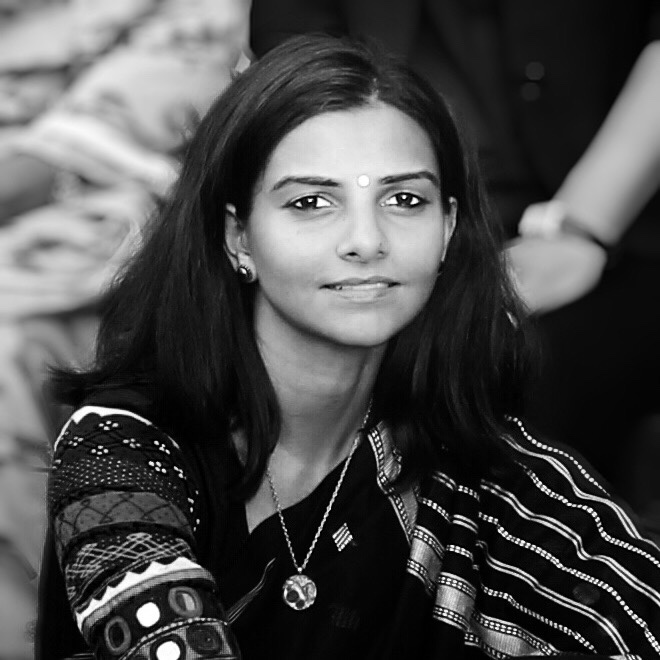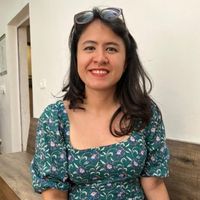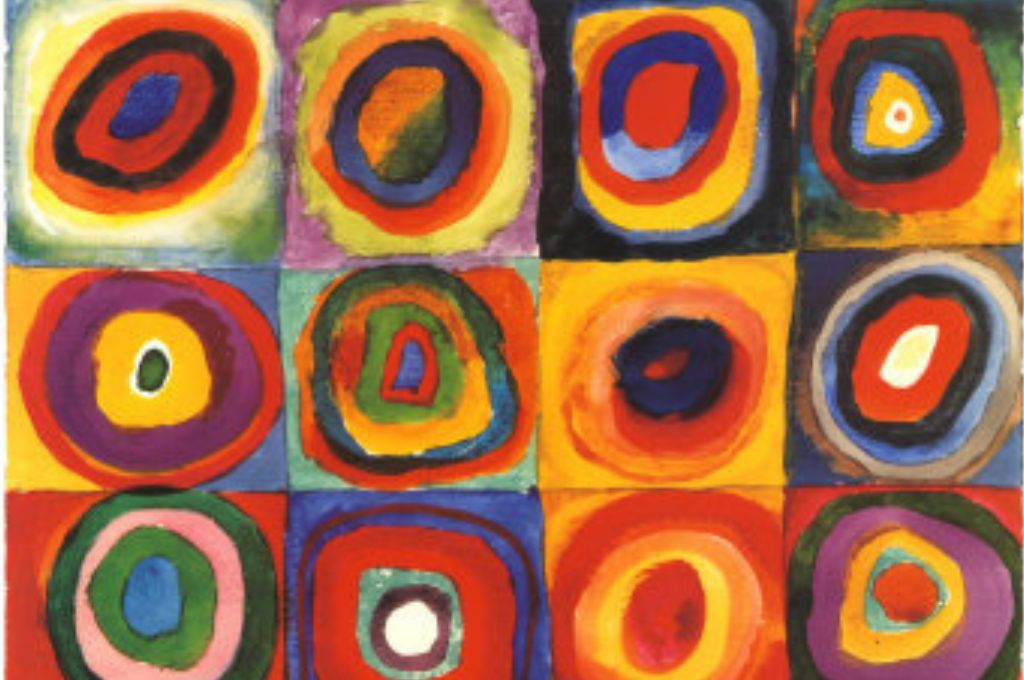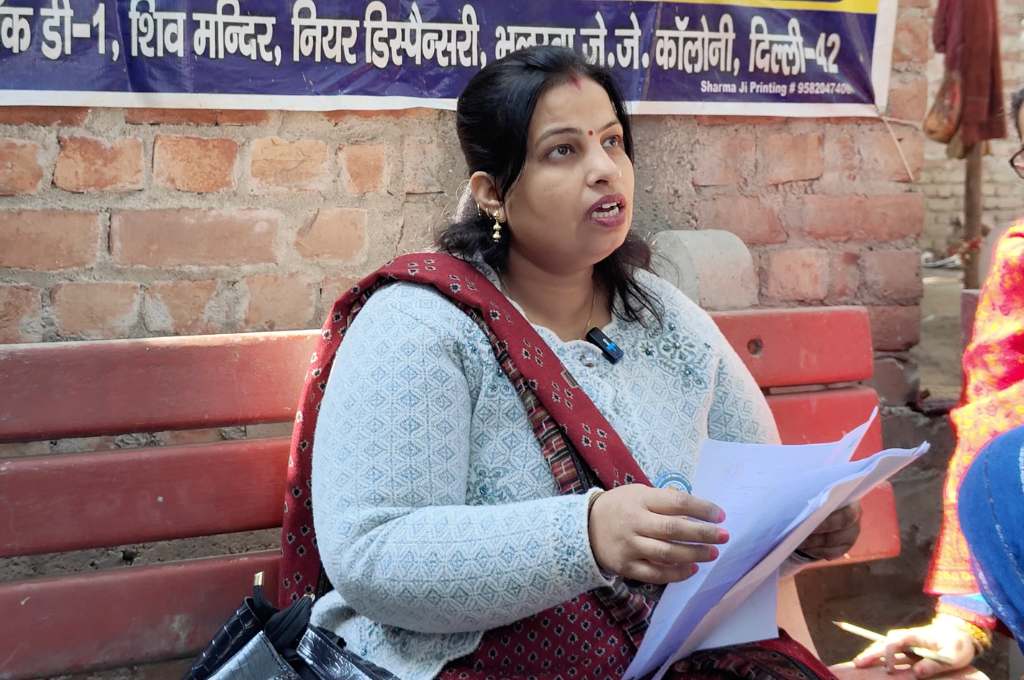Sujata Khandekar is the founding director of Community of Resource Organisations (CORO), one of the country’s foremost organisations for grassroots leadership and activism. Facilitating grassroots leadership by addressing issues that the community itself identifies is central to Sujata’s vision and CORO’s interventions. Sujata’s work over the past three decades has further led her to explore empowerment of grassroots women in urban and rural contexts. Her PhD thesis, Meanings of Women’s Empowerment, with seven grassroots co-researchers focuses on this as well.
In this interview with IDR, Sujata talks about why lived experiences and the wisdom of grassroots communities are important when designing programmes for social change, and how dialogue and collective knowledge building with communities is the right way forward.
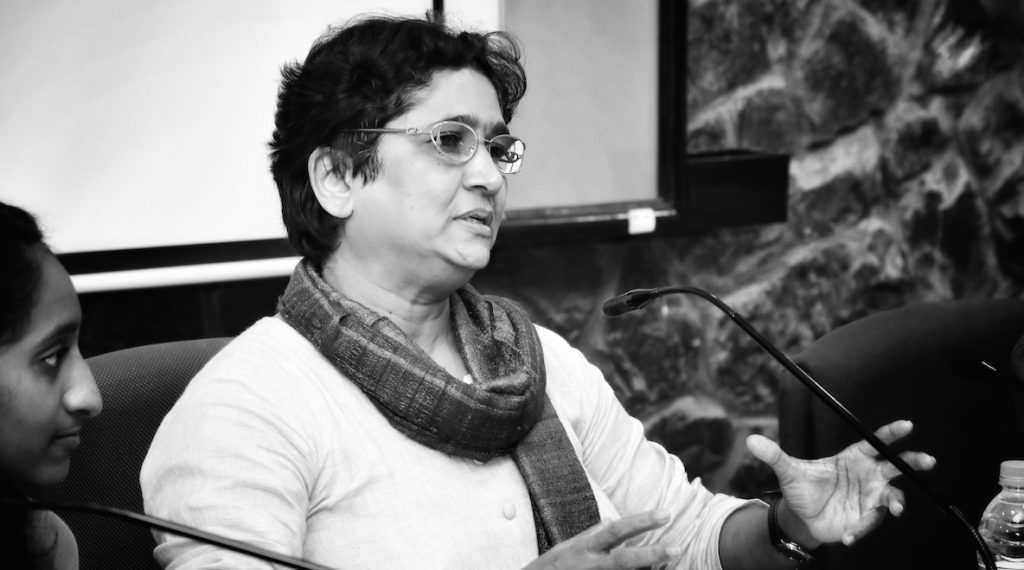
You have spoken about the need to build collective knowledge from the grassroots. Can you talk about when this idea began to take root for you, and why?
I think this realisation of the need to build collective knowledge from the grassroots is a culmination of what we at CORO have learned across three decades of work. Right from its inception in 1989, CORO has been working with some of the most marginalised communities in India, and over time the organisation has evolved into a grassroots-owned organisation that is led, shaped, and managed by grassroots communities. I am the outlier, as both an outsider (given that my social location is different from many who are a part of CORO) and insider, because I am 100 percent immersed in everything that happens at the organisation.
Over the years I’ve noticed that grassroots people are almost always seen as ‘beneficiaries’. Through our work I have realised just how much knowledge, wisdom, energy, activism, and leadership exists within these communities. In many organisations or academic institutions, the community may be involved with research, designing and implementing programmes, and collecting data as well as analysing it. But when it comes to knowledge building, there is still a fairly well-demarcated hierarchy in the relationship between the institutions and the community.
We need a different lens to look at the grassroots, so we can see them as leaders, and as knowledge creators.
We tend to presume that people who speak English or have college degrees hold all the knowledge. Due to this bias, people from the community become a mere data source for further research or programming. But this lens is myopic, because India is so rich in its diversity—there are multiple experiences, perspectives, and nuances, all of which are valid and important. Moreover, people from marginalised backgrounds face struggle upon struggle, and it is this lived experience that uniquely places them in a position of insight and wisdom.
It was with this realisation of the importance of recognising and learning from grassroots knowledge that I felt a paradigm shift is essential. We need a different lens to look at the grassroots, so we can see them as leaders, and as knowledge creators. Leadership cannot only be leadership in activism; it must be leadership in building and asserting grassroots knowledge as well.
And ultimately this boils down to the politics of knowledge building. It is about who is trusted, who is believed and why, and what gets ‘counted’ as knowledge and why.
How do we make this happen, though? There has been a prevailing power dynamic for some time now. All the things you are saying about people’s beliefs on whose knowledge is more ‘important’—how do we change that at both ends? How does the community value their own wisdom, and how do the ‘outsiders’, like you put it, integrate their wisdom into our ways of thinking and being?
You rightly mentioned facilitating change at both ends. Unfortunately, most often even the very experienced people from the grassroots don’t think that they are knowledge creators. This ‘active’ awareness (which gets augmented with doing) needs to be facilitated at the grassroots as well. Collective action is essential because individuals may not be able to assert themselves on their own, especially since doing so will challenge the popular and accepted ways of building knowledge. Therefore, initially it will be important to co-create knowledge with others beyond the community, so that grassroots knowledge can be valued and shared with the outside world.
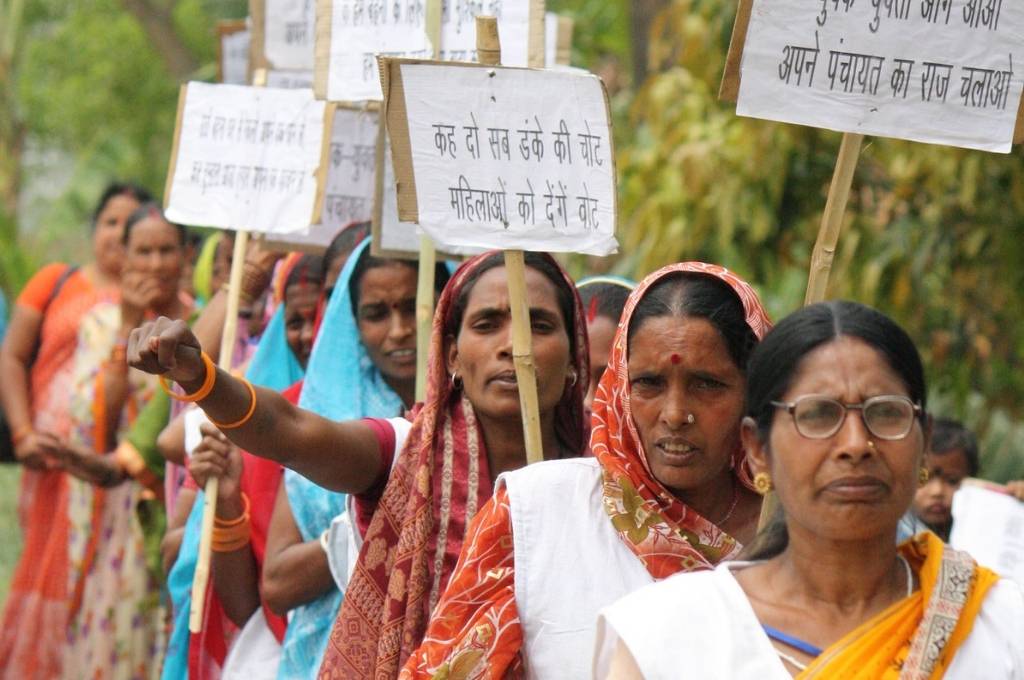
Let me give an example. In 2019, I was in the midst of completing my PhD on the topic of the meanings of women’s empowerment. I wanted to explore the different forms empowerment can take, and how women perceive their empowerment and what it can mean for women coming from different social contexts. But I wanted to co-create this with grassroots women, and build knowledge collectively. For them to share their lived experiences—so that we could together reflect and draw meaning from them—we required a non-hierarchical, non-judgmental, non-threatening environment. The research methodology I pursued, ‘Feminist Cooperative Inquiry’, is one in which participants are co-researchers involved in decision-making at all stages of the research.
I was the research facilitator and also a co-subject in this research. My co-researchers were my friends and colleagues from CORO, some of whom I had known for two decades. Dwarka is from the Pardhi community, which is a denotified tribe that still faces a lot of stigma. Mumtaz and Anwari are Muslims from low-income urban communities; Sheela, Anita, and Vinaya are Dalits from urban and rural settings; Pallavi is a Maratha from a poor economic background; and I am a Brahmin who has led a privileged life. Five of the eight co-researchers were either non-literate or had studied up to class nine. All of us came from different social locations, and had our own baggage. And all of us were involved at every stage of the research process (barring the writing of the thesis, which I did alone on account of my knowledge of English).
As part of the study, we shared our life narratives through dialogues with each other. I conversed with each one of them, for up to seven or eight hours, and then all seven of them conversed with me, based on the same guidelines that we had generated in the process of our conversations. We stayed together for six days and really analysed what we had shared, and why certain things had happened.
It was during this time that I understood the power of dialogue and co-creation. I recall sharing my life story with my co-researchers. In response, Anwari remarked how different her life had been because she was never allowed to go to school. She said, “Your entire childhood life story revolves around education and school; all your stories of childhood are just about school teachers, and how your parents supported you through your education. I feel so much tension that we are so different.” Anwari had never gone to school, so her childhood had looked nothing like mine.
There should be recognition and respect of grassroots experience and wisdom in all aspects of life.
Dwarka, my Pardhi colleague, spoke about how she used to think that only her community experienced grief. She said, “When you were speaking, I realised that all women—whether Brahmin or tribal—experience grief.” These conversations weren’t about finding similarities between us; they were about respecting our diversities and understanding why our experiences were different, and where our situations overlapped. It was these kinds of conversations that led to our understanding of intersectionality, and of empowerment. All of this was only made possible because we decided to build knowledge together for this study.
I believe that when people realise why they are different from others, or why they are at different points in their life trajectories, it’s a very hopeful place to be.
And the point is that there should be recognition and respect of grassroots experience and wisdom in all aspects of life. We shouldn’t stop at organisations like CORO or other nonprofits that may recognise the value of grassroots knowledge. As a society, we need to graduate to integrating grassroots knowledge and experience into our own thinking and doing. The question I am now trying to answer is: How do we get there? Can this become a social need for achieving balanced and equitable growth?
How do you think this can happen at a societal level?
1. It can only happen through dialogue and sharing and learning
Human beings and their social contexts are different. Therefore, designing for social change will also be a complex process. To be able to understand these contexts and complexities, we need to co-create solutions with communities. Today, a majority of us operate in silos, and in a compartmentalised manner. This is where dialogue comes in, as it can help us dissolve these boundaries. While the process of dialogue can be unsettling, the gains are well worth the discomfort.
2. We need to change our mindsets
This journey is about co-travelling and mutual sharing and learning. As a society we need to understand that we are all eventually sitting on the same side of the table. Instead, we make this false distinction between ‘us’ and ‘them’, when we are in fact more similar than we realise.
We also need to look beyond the patronising idea that people at the grassroots ‘need our help’. When we engage with them on a truly equal footing, we will realise how much we can learn from them too.
3. We need to value the wisdom of lived experience
Communities need to be part of the process of designing interventions for social change, from conceptualisation to execution. In the social sector, however, the relationship between nonprofits and communities tends to be hierarchical in nature, especially when it comes to building knowledge to create change.
But what if we were to change how we view the communities and look at them as knowledge creators too? What if instead of designing for them, we co-create with them based on their social context, their lived realities, their life struggles, and their learnings? What if we build knowledge and work on solutions collectively? There is a lot more our sector needs to do to correct the power imbalance between communities and organisations that purport to serve them.
Knowledge is independent of a formal degree.
Second, knowledge building is closely linked with academia, and academia needs to reconsider how it values knowledge. I have been arguing how knowledge is independent of a formal degree. Yet, most academic institutions require qualifications on paper, and value academic language and presentation more than content.
There is a role for academia to play in helping uncover new knowledge, particularly from grassroots communities whose lived experiences can bring a lot of insight to contemporary debates on a range of issues. This is important given that academic institutions carry weight and credibility, and are key to bringing about a change in how society values grassroots knowledge. Institutions should look beyond degrees and put together programmes that help bring this knowledge to light. Doing this consistently over time will help address unequal power dynamics in knowledge creation between the ‘formally educated’ and grassroots communities.
If we want real social change to happen, we must start this process of learning from the grassroots. We cannot wait any longer.
—
Know more
- Read this paper to learn more about ‘Feminist Cooperative Inquiry’ as a research methodology.


